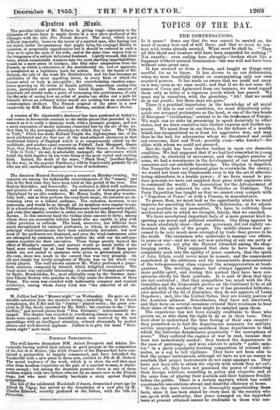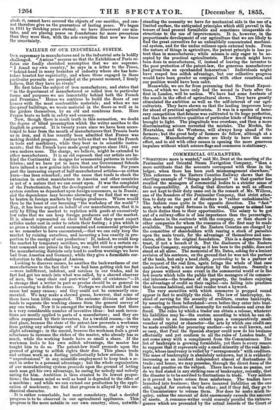TOPICS OF THE DAY . .
TILE COMPENSATIONS.
Is it peace ? Some say that the war cannot be carrried on, for want of money here and of will there, and that we must be con- tent with terms already scouted. What must be shall be. "Then all this blood and treasure will have been expended for nothing!" Not exactly : even ending here abruptly—broken short like a fragment without natural termination—the war will not have been without some great uses.
It has aroused us from a dream, and taught us thine very needful for us to know. It has shown to us our deficiencies, when we were boastfully intent on contemplating only our own acquired powers. It has made us aware that we could not carry on a war' even as we once could; and that if we do not erase the names of Crecy and Agincourt from our banners' we must regard them only as relics of a vigorous youth which has passed. We must say to ourselves, with the grandeire, "Ala! that we could do in our youth; but those days are gone.'
There is a practical importance in the knowledge of all moral truth. If this is our real condition, we must definitively relin- quish our arrogant pretensions as the head, or one of the two heads of European "civilization," content to be the tradesman of Europe. We must run no risks by presuming to speak decisively to other states, lest we draw ourselves into further expense and further ex- posure. We must draw in our forces, for the defence of a wealth which has incapacitated us at least for aggressive war, and may thus be the bait for adversaries whom we threatened and could not overcome, East and West ; possibly even—who knows ?—for allies with whom we could not proceed.
But the light has been thrown further in upon our domestic; condition. We had supposed that if we had lost somewhat in young audacity, in elasticity of movement, and the rougher practice of arms, we had a recompense in the development of our mechanical resources and our scientific knowledge. The illusion is dispelled. Our Nasmyths have not produoed guns to overwhelm the enemy ; we would not trust our Dundonalds even to try the art of adminis- tering chloroform to a hostile power • if we have ceased to pro- duce generals we have not supplied their place with engineers able to command the world ; the Association for the Advancement of Science has not achieved its own Waterloo or Trafalgar. The Paris Exposition has taught us that we cannot even compete with a "Napoleon of Peace," or with a Prussia, in manufactures.
To peace, then, we must look as the opportunity which we must improve for amending these mortifying deficiencies, or for adjust- ing our position to our necessities. We have to cultivate those mechanical arts in which we thought, falsely, that we excelled. We have ascertained important facts of a more general kind re- specting our moral and political condition. One thing appears to be made absolutely clear—that our governors did not rightly un- derstand the spirit of the people. The middle classes were pre- sumed to be very much more corrupted by trade than proves to be the truth. The statesmen who undertake to manage our affairs, in peace or war—and we are not now pointing at any one party or set of men—do not play the Ilaroun Alraschid among the shop- keeping ranks, They supposed that class to have become so completely sunk into the apathy of peace comforts, that the spirit of John Gilpin could never more be roused; and the amazement manifested at the addresses and the innumerable demonstrations of the vote-possessing class exposed the misappreciation at head- quarters. The working classes had always appeared to retain more public spirit, and during this contest they have been con- spicuous chiefly for their quietude. It is said of them that they are not contented ; that they sympathize too much with the Na- tionalities and the Democratic parties on the Continent to be at all satisfied with the conduct of the war as it has proceeded hitherto; ever mindful of the 2d of December, they do not approve of Louis Napoleon ; and, like the United States, they are keenly jealous of the Austrian alliance. Nevertheless, they have not interfered, and they have on several occasions evinced their readiness to bear their share of the sacrifice that might be entailed upon them. The experience has not been equally creditable to those who govern us, or who claim the right to do so in their turn. They were slow to understand the true feeling of their own country : they permitted us to find the departments necessary for military service unprepared; having sacrificed those departments to that which the historian denominates generically " the corruptions of peace." They suffered the engines of war to rust, because they were not immediately needed ; they farmed the departments to the uses of patronage ; and were content to satisfy "public opin-
ion" in a party popularity-hunting competition of reduced esti- mates, as a sop to lull vigilance. They have not been able to find the proper instruments, although we have as yet no reason to conclude that proper instruments do not exist amongst us. They have not been able to attain the objects with which they act out ; but above all, they have not possessed the power of conducting their foreign relations according to policy and etiquette and at the same time of placing their position and their business frankly before the public. There is a certain mystery which has veiled questionable associations abroad and doubtful efficiency at home. We are the more interested in thoroughly apprehending these facts, since it has been stated by every man in the country who can speak with authority, that peace arranged on the imperfect basis at present attained cannot be creditable to those who con- elude it, cannot have secured the objects of our sacrifice, and can- not therefore give us the guarantees of lasting peace. We began in 1851 by thinking peace eternal; we have discovered our mis- take, and are placing peace on foundations far more precarious than they were then, with the sole exception that now we know the uncertainty.



































 Previous page
Previous page